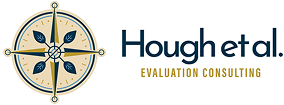Full Cycle Evaluation
A Full Cycle Hough et al. evaluation contains all of the boutique evaluation elements customized to your individual project needs and your diverse stakeholder use. The Full Cycle evaluation package has five components: planning and proposal writing, implementation evaluation, progressive evaluation, summative yearly evaluation (including reports for funders), and repurposing for publication.

The Full cycle evaluation adheres to the 6 NSF evaluation principles of Relevance, Independence, High Quality and Rigor, Transparency, Ethics, Equity.
The Process
During the proposal writing phase Hough et al. works with project teams to construct a logic map on which to build the evaluation plan. The implementation component of the evaluation is used to monitor which proposed activities take place and the outputs from those activities (what occurs, when, for whom and for what purpose). The progressive component is framed using a responsive evaluation perspective, often using naturalistic as well as quantitative methods and places focus on how project activities are moving participants and stakeholders towards outputs, short-term outcomes, as well as unanticipated outcomes. If the program is not originally based on a theoretical or conceptual framework, a lens through which to view initial outcomes can emerge through this component. The summative evaluation is outcome focused and assesses the extent to which both the short, and the long-term outcomes have been achieved. Each component is written up into a yearly report for project stakeholders. The fifth component is where the evaluator works as a thought partner for the project team so that the data analysis and/or evaluation results can be written up for publication.
Evaluation Data Collection
Together we choose data collection techniques tailored to your specific program theory, evaluation/research question or monitoring needs:
- Qualtrics Survey (with validated scales to measure sense of belonging, efficacy, STEM identity, math anxiety, …)
- Creation and validation of custom Qualtrics scale to measure items specific to your project (eg. specific STEM content)
- Qualtrics questionnaire (narrative, open-ended and/or task -based items with demographic data)
- Qualitative structured, semi-structured or unstructured interviews
- Focus groups
- Collection of program artifacts
- Event observation and video taping
- Participant and event tracking
If you don’t need the full cycle evaluation any of these components can be offered as boutique evaluations.
Working with Sarah as the external evaluator for our NSF S-STEM program over the past four years has been extraordinary. Her evaluation work is so thorough, insightful and creative. She has really been able to capture the essence of our project and the experiences of our participants. Her evaluation has resulted in several key adaptations of our program.
Dr. Kimberley Seashore, SFSU,Mathematics Department
Thank you again for your yeoman effort to put together everything for my report and sending it to me on such short notice! You are such a talented evaluator and a dear person! I appreciate you!
Dr, Carol Fry Bolin, Fresno State, Kremen School of Education
I highly recommend Sarah’s evaluation-to-research services, which expertly bridge the gap between analysis and impactful dissemination. Together, we effortlessly transform evaluation results into compelling conference and journal papers, ensuring that every finding is both useful and influential.
Dr. Yaomingxin Lu, Fresno State,Mathematics Department
I appreciate the way that Sarah has brought her intellectual experience to working with me to write up the results of our project for publication. She has helped to find theoretical frameworks that capture and illuminate the work that we are doing. I cannot wait to work with her on future projects.
Dr. Kimberley Seashore, SFSU, Mathematics Department
